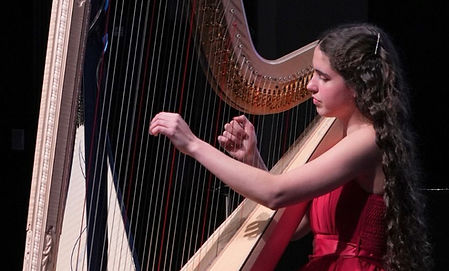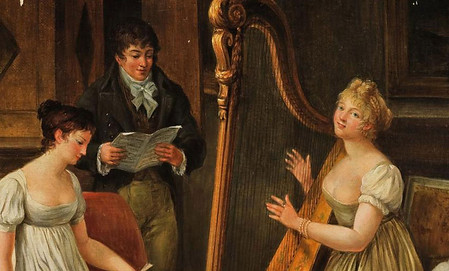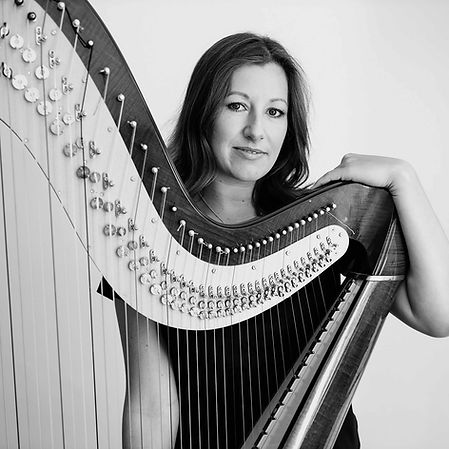
30 June & 1 July 2025
Silk Street Lecture Recital Room
Guildhall Summer Harp Festival 2025
Generously sponsored by Salvi Harps London
Digital Programmes
Please silence your devices and lower the brightness of your display.
This digital programme is intended for mobile devices, and may be viewed throughout the performance.
Do you have thoughts on our recent switch to digital programmes? Fill out our Audience Feedback Form.
Silk Street
Eating is not permitted in the auditorium. Drinks are allowed inside the auditorium in polycarbonates.
Filming or recording of the performance is not permitted.
Latecomers will be able to enter the auditorium at a suitable break in the performance.
Guildhall School of Music & Drama
Founded in 1880 by the City of London Corporation
Chair of the Board of Governors
The Hon. Emily Benn
Principal
Professor Jonathan Vaughan
Vice-Principal & Director of Music
Armin Zanner
Select Programme:
Masterclass with Elisabeth Plank
Monday 30 June, 9.30am – 5.15pm
Teodora Cotuna Recital
Monday 30 June, 6.30pm
‘Affekt and Affectation’ – the Harp in Jane Austen’s Musical World
Tuesday 1 July, 12pm
Tara Minton Lunchtime Jazz Recital
Tuesday 1 July, 1.15pm
Tuesday 1 July, 2.15pm
Early Harp Department: Legends
Tuesday 1 July, 3.30pm
Masterclass with Elisabeth Plank
Monday 30 June
9.30am – 5.15pm
Silk Street Lecture Recital Room
9.30–10.10am Bethany Caswell
Gilad Cohen Doaa and Masa
10.10–10.50am Eleanor Medcalf
Hindemith Harp Sonata
10.50–11.30am Emilia Agajew
Mikhail Mchedelov Variations on Corelli's ‘La Folia’
11.30–11.50 Break
11.50am–12.30pm Emily Hopper
Germaine Tailleferre Sonata for Harp
12.30–1.10pm Naomi Drew
Henriette Renié Contemplation
1.10–2.10pm Lunch
2.10–2.50pm Arwen Withey-Harrison
Mozart Concerto for flute and harp in C major, K299 (III. Rondeau)
2.50–3.30pm Sabrina Savenkova
Esteban Benzecry Alwa
3.30–3.50pm Break
3.50–4.30pm Bibi Afshar-Shirazi
André-François Marescotti Mouvement pour harp
4.30–5.10pm Grace Ng
Smetana The Moldau
Elisabeth Plank

Photo © Julia Wesely
Austrian harpist Elisabeth Plank has established herself as an internationally sought-after soloist and ambassador for her instrument. She presents the harp as a versatile and exciting instrument: rich in colours and textures, with its unusual repertoire and a broad stylistic spectrum. Elisabeth Plank’s ambition to sharpen and broaden the harp’s profile has added musical rediscoveries and new compositions dedicated to her to the harp’s repertoire, as well as many world premiere recordings. It is Elisabeth Plank’s ambition to redefine the harp’s repertoire, by performing and recording newly rediscovered pieces from the past, as well as collaborating with contemporary composers. Her own arrangements have been published by Universal Edition and others.
As recitalist or as soloist with orchestra, Elisabeth has performed in renowned concert halls and festivals in Europe, Japan and Latin America – such as Musikverein Wien, Wiener Konzerthaus, Harpa Reykjavík, Konzerthaus Berlin, Grafenegg and NOSPR, as well as at international festivals: MDR Musiksommmer, moselmusikfestival, Bogotá International Music Festival or Festival de Música de Morelia Mexico. She performs with orchestras such as ORF Radio-Symphonieorchester Wien, Barockensemble der Wiener Symphoniker, Wiener KammerOrchester, NFM Leopoldinum Orchestra, Iasi Philharmonic Orchestra or Thüringer Symphoniker, and she has numerous recordings to her name.
Elisabeth Plank is a prizewinner in a number of international competitions. From 2019 to 2021 Elisabeth Plank was artist-in-residence of Wiener Konzerthaus as part of the ‘Great Talent’ series. Besides being a selected artist for Classical Futures Europe, Elisabeth Plank was the first harpist ever chosen as musical ambassador for the New Austrian Sound of Music for 2023/24.
Elisabeth Plank was born in Vienna in 1991 and had her first harp lesson at age seven. She studied at the University of Music and Performing Arts Vienna under the tuition of Adelheid Blovsky-Miller and Mirjam Schröder. She also worked with Fabrice Pierre in Brescia. Elisabeth is a lecturer at the University of Music and Performing Arts Vienna, at international masterclasses and workshops, and is founder and artistic director of Vienna Harp Days.
Teodora Cotuna
Recital
Monday 30 June, 6.30pm
Silk Street Lecture Recital Room
Scarlatti Sonata in F minor, K466
Renié Pièce Symphonique
Debussy Rêverie
Salzedo Variations sur un thème dans le style ancien, Op 30
Interval
Houdy Sonata for Harp
I. Allegro moderato
II. Lento
III. Vivo
Kalen Smith Bioluminescence
Debussy Images oubliées
II. Sarabande. Souvenir du Louvre
Grandjany Rhapsodie pour la Harpe
Teodora Cotuna Rizea
.jpg)
Teodora Cotuna Rizea was born in Spain in 2004. She started playing the harp at the age of 6 and was a student of Ana Martínez Cano at the Professional Conservatoire of Music in Valencia, where she received Professional Prizes in Harp and Chamber Music upon completing her studies, as well as the RSEAPV Ricardo Callejo Scholarship Award. From 2020 to 2022 she continued her education with harpists Gabriella Dall’Olio and Tiziana Tagliani. She is a prize-winner of several national and international competitions, such as the International Harp Contest “Suoni d'Arpa” (Italy), International Music Competition “Petar Konjovic” (Serbia), "ArpaPlus" Competition (Spain) and International Competition for Young Performers “Ciutat de Llíria” (Spain). Between 2016 and 2020 she was a member of Madrid Symphony Orchestra’s ‘Proyecto Talentos’, performing regularly at the National Auditorium of Spain in various chamber and orchestral formations. Teodora is currently finishing her Bachelor’s degree with Letizia Belmondo at the Haute École de Musique de Lausanne. She has also been principal harpist of the Youth Orquestra of Valencia (JOGV) since 2019, and enjoys taking part in many orchestral projects in Spain and Switzerland. This season she has appeared at the Opéra de Lausanne during the finale of the Kattenburg Lyric Competition. In 2025, Teodora won the 1st Prize at the Ceren Necipoglu Istanbul International Harp Festival in Turkey, part of the prize including this recital.

Forthcoming Events
27 May – 2 July 2025
Milton Court Concert Hall & Silk Street Music Hall
Enjoy over a month of free recitals by undergraduate and postgraduate musicians at Guildhall School.
1 July 2025
Silk Street Music Hall
Our annual showcase celebrating the smallest of orchestral wind instruments, presented by the Wind, Brass & Percussion department.
Guildhall Wigmore Prize Recital
27 July 2025
Wigmore Hall
Violinist Kryštof Kohout, winner of the 2025 Guildhall Wigmore Recital Prize, will perform a diverse programme at Wigmore Hall featuring London premieres by Czech composers alongside works by Bartók and Strauss.
‘Affekt and Affectation’ – the Harp in Jane Austen’s Musical World
Tuesday 1 July, 12pm
Silk Street Lecture Recital Room

During Jane Austen’s lifetime, the harp was experiencing a ‘golden age’. In this fascinating lecture-recital, marking the 250th year since her birth, we explore the harp's role in Jane Austen’s musical life and in her novels.
Eleanor Medcalf harp and narrator
Bethany Caswell harp
Philippe-Jacques Meyer (1737–1819)
‘Andante’ from Sonata in E-flat major, Op 3 No 6
Jean-Baptiste Krumpholz (1742–1790)
‘Romanza’ from Harp Concerto in D minor, Op 9 No 6
Anne-Marie Krumpholtz (c.1766–1823)
Theme from Variations on Robin Adair
Carl Philipp Emanuel Bach (1714–1788)
‘Adagio un poco’ from Harp Sonata in G major, Wq139
Domenico Scarlatti (1685–1757)
Sonata in A major, K208
Maria Antonia Josefa Johanna ‘Marie Antoinette’ (1755–1793)
C’est mon ami
Sophia Dussek (1775–1831)
‘Allegro’ from Harp Sonata in C minor, Op 2 No 3
Tara Minton Lunchtime Jazz Recital
Tuesday 1 July, 1.15pm
Silk Street Lecture Recital Room
Tara Minton

Through a curtain of strings she sits and sings you into another place. No one who hears Tara Minton perform walks away untouched. She has that strikingly rare entwinement of harp and voice, but in Tara’s case there’s something more at work: a talent made to plumb depths and scale heights. To see her live is to witness an overflowing of musicality and truth, spilling forth from strings and lips, a siren song that speaks directly to the human soul.
When she first arrived in London, in 2011, Tara had already performed many seasons as harpist for Melbourne Opera, released a solo EP and had returned to her old University as a visiting guest Musical Director. Not bad for an artist so young in her career. Oh, and she carried with her an endorsement from the legendary French harp makers “Les Harpes Camac”, bestowed upon her by their director, Jakez François. Tara now plays the Camac “Big Blue” resulted from their singular lunch meeting in Lygon St, Melbourne, during which Jakez prophesised, “Your success is the harp’s success.”
How right he was. Sold-out concerts followed throughout the UK and Europe and back home in Melbourne, often concluded by snaking backstage queues of the star struck. It isn’t just Tara’s “blessing of a voice” (Mancunian Matters), nor is it the way that she plucks tunes for the songbooks of the world and sets them swinging again as though they have been written afresh. No, as Jakez himself so eloquently puts it: “Tara’s musical expression is equalled only by her warmth and integrity.”
Released in 2016 with a sell out launch at the Elgar Room in the Royal Albert Hall, Tara’s first album The Tides of Love is a flood, a tumbling, yearning, swooping collection of songs, which reveal a broad gamut of influences. ‘The Tides of Love’, ‘February Forever’, ‘Tower of London’ – these songs combine the grandeur of balladry with deft arrangement, superb musicianship and, perhaps most wrenchingly of all, truth. Tara’s performance is stunning. There is not a lyric that does not carry with it a depth of meaning, as with the undulating melodies and swelling harmony. The two inhabit one another and Tara inhabits them both. But how did this young jazz harpist come to craft such exquisite songs?
Says Tara: “all art tells a story. Whatever the medium, the story is the most important thing… I try to compose music that supports my narrative, my feeling in the moment. Every time I play one of my songs, I get to revisit the place I was in when I wrote it and a little of that feeling is released.”
The great thing about The Tides of Love is that it captures Tara in first flood, propelled by the momentum of relentless composing, crafting and performing all over the place.
For, quite clearly, a great deal of perspiration overlays the inspiration. Beyond the ballrooms and the dressing rooms, Tara is at heart a gigging musician, willing to put in the time – and the miles – across the venue spectrum, from the dullest of metropolitan hotel lounges to the tiniest of ancient rural churches. Says she: “I have driven countless miles with my harp – Lithuania, the Côte D’Azur, Paris, right across Italy twice, the Netherlands and Ireland” – necessary, for only in her Ford Galaxy can she be sure of the instrument’s safe conveyance. She’s crisscrossed Europe and the Antipodes, playing to audiences old and young, large and small. And her repertoire on these jaunts is similarly eclectic: jazz, Gypsy jazz, classical, soaring pop, even, on occasion, dance music.
Tara hails from Melbourne, Australia. Her parents ran a bookmakers’ and were not musicians themselves, but they urged her on in her musical quest. Piano was the first discovery, when she was four years old, stumbling across one in the spare room of a mother’s friend. Piano lessons started when she was seven, augmented by voice coaching and a brief jaunt learning flute. Then, at ten, came the harp: “my burden, my prison, my wings!”
She held such promise at this young age: A clean sweep of school talent competitions. A music scholarship won to a fine school. Everyone was fascinated by her harp playing, but Tara was by this point a formidable pianist. At fifteen, a few years ahead of her contemporaries, she performed Rachmaninov’s fiendish Prelude in C-sharp Minor at the school music gala. Then beckoned The Ballarat Academy of Performing Arts for an undergrad in Musical Theatre. As Tara says: “I learned to sing. Really sing. I also learned to be comfortable just ‘being’ in front of an audience.”
Presumably this stood her in good stead when twelve years later, in May 2018, Tara accompanied Björk on Later… with Jools Holland and toured with her to headline Primavera Sounds in Barcelona. Of this she remarks, drolly, “it turns out playing to a crowd of 40,000 is much less terrifying than playing to a jazz audience at the 606!” But her Björk collaboration is a reminder of Tara’s uniqueness as an artist, her ability to span genres and musical worlds with her harp. Fittingly, Tara feels it her mission to “unleash the harp and its potential from the confines of the ‘harp bubble’ and release it into the wider world of music.” And, in this, the roll-call of artists with which she has worked speaks for itself: Björk, Miranda Mulholland, Kitty, Daisy & Lewis, Tom Walker, SuRie, Tony Kofi, Paul Lee. There are many more.
A harpist must be seated to play, but Tara never sits still for long. In 2019 she completed her academic journey with a Masters’ degree in jazz performance from Guildhall School. In February 2020, she toured with Miranda Mulholland to Mexico, then mere days later succeeded in reaching the finals of the World Harp Competition in Utrecht (sadly postponed at the time of writing due to COVID-19). Oh, and composed and recorded a brand new album.
Please Do Not Ignore The Mermaid addresses sea-themes, environmental spoilage, and feminine mer-myth. A jazz record with a fluid ECM sound, it’s a work which illustrates just how far Tara has travelled from those formative years in Melbourne, those mercurial early days in London, from the towering balladry of her first album. Her second record is a louche, sprawling, charismatic affair. It’s quite unlike anything you will have heard before, and it’s singularly apt that it should deal with the sea. For Tara’s harp has something of the otherness of the sea, while her voice captures its untrammelled power and depth. Please, for love, do not ignore this mermaid.
– Tom Nancollas
Contemporary Music Showcase
Tuesday 1 July, 2.15pm
Silk Street Lecture Recital Room
Gilad Cohen Doaa and Masa
Bethany Caswell harp
Sally Beamish Awuya
Grace Ng harp
Hollie Harding Summertide
I. Reverie
II. Glisten
III. Haze
Emily Hopper harp
Berkant Gençkal The Stairs of M.C. Escher
Emilia Agajew harp
Robin Holloway Suite for Harp (World Premiere)
Eleanor Medcalf harp
Early Harp Department: Legends
Tuesday 1 July, 3.30pm
Silk Street Lecture Recital Room

Grace Ng harp
Naomi Drew harp
Arwen Withey-Harrison harp
Emilia Agajew harp
Bibi Afshar-Shirazi harp
Eleanor Medcalf harp
Hannah Hughes soprano
Tom Dilley harpsichord
Stefano Fiacco theorbo
Llibre Vermell de Montserrat (14th century)
Los Set Gotxs
Blondel de Nesle (late 12th century)
Chanson
Beatriz de Día (12th century)
A Chantar
Llibre Vermell de Montserrat (14th century)
Stella Splendens
Ladino Folk Song (late 15th century)
La Rosa Enfloresa
Claudio Monteverdi (1607)
Harp solo from L'Orfeo
Claudio Monteverdi (1608)
Lamento D'Arianna
Folk jig by Máirtín O'Connor
Rockin the Boat
Turloch O'Carolan (1670–1738)
Carolan’s Cottage
John Playford (17th century)
Female Sailor

Donate
We hope you thoroughly enjoy today’s performance at Guildhall School. If you feel inspired by our students and would like to support world-class training for these talented performers and production artists, we would be grateful for a voluntary donation.
Join the Guildhall Circle to access priority booking, exclusive events and more while providing vital support to our students. Join us at gsmd.ac.uk/patrons.
Alternatively, you can make your donation online by visiting gsmd.ac.uk/donate. Thank you.
Please visit our website at gsmd.ac.uk

Guildhall School is provided by the City of London Corporation as part of its contribution to the cultural life of London and the nation.


